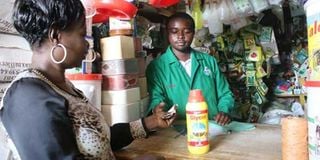How I make Sh200,000 monthly running a successful agrovet

Joe Mukundi serves a customer at Muwa agrovet in Runyenjes, Embu County. PHOTO | KENNEDY KIMANTHI | NATION MEDIA GROUP
What you need to know:
For about three years now, the young man has effectively juggled school and an agribusiness.
To start an aggrovet shop, one needs a county business permit and certifications from the Pest Control and Products Board and Kenya Veterinary Board and Kenya Plant Health Inspectorate Service (Kephis).
His mother Pheris Karimi helps him run the business, enabling him to attend college.
In a good month, he takes home over Sh200,000.
The agrovet in Runyenjes, Embu, is stocked to the brim that one seemingly has no space to turn.
Packets of seeds, fertiliser and farm equipment, among other supplies, sit pretty on the shelves of the shop, smiling back at customers.
Standing at the counter serving a customer with great keenness is 22-year-old Joe Mukundi.
The fourth year Bachelor of Science in Agriculture, Meru University of Science and Technology (MUST) student runs the shop that he inherited from his father and pumped in Sh250,000, Sh150,000 from his savings and the rest from friends.
For about three years now, the young man has effectively juggled school and the business named Muwa Agro-Tech, that his father Kenneth Mugendi, who died in 2005 and was a trained animal health personnel, started.
“When my father died, I was still young. My mother took over the running of the shop, which then was at Kanja market centre. I was helping her all along but after attaining a Certificate in Agriculture from MUST in 2013 and later a diploma in the same course, I took over the management in 2014 and moved the shop to Runyenjes,” says Mukundi, who kept chickens while studying at Moi High School Mbiruri between 2009 and 2012.
To start the shop, one needs a county business permit and certifications from the Pest Control and Products Board (PCPB), the Kenya Veterinary Board and Kenya Plant Health Inspectorate Service (Kephis).
“Certificates from these organisation should always be displayed in your shop to give customers confidence that they are buying from a trusted source,” says Mukundi, who does not sell injectable animal drugs.
The agrovet is one of the most popular in the town.
“I sell agrochemicals, feeds, supplements, fertilisers, pumps and other equipment,” he offers, cautioning some of the chemicals and fertilisers should not be exposed to direct sunlight as this is likely to reduce the effectiveness.
The different products must also be arranged in a manner that avoids contamination. And he has ensured this by opening two additional stores to keep pesticides, agro-chemicals and feeds.
“It is a lucrative business, but one can easily make mistakes like stocking fake goods and products. It is important to source drugs from stores certified and recognised government institutions such as Kephis.”
His mother Pheris Karimi helps him run the business, enabling him to attend college.
“However, I regularly keep in touch and check on the business four days in a week.”
GOOD RETURNS
He has four employees, one who has a certificate in vet medicine.
From his business, Mukundi has been able to pay his school fees without any hitches. In a good month, he takes home over Sh200,000.
“Running an agrovet has its highs and low. Profits are high during the planting season when farmers buy seeds and chemicals in plenty and when they harvest. In between is almost a dry season. This business is also capital intensive and great caution has to be taken when dealing with different products.”
It is also not easy to introduce farmers to new products, thus, some products can expire while on the shelves.
“That is why you will find many agrovets do not stock products from several manufacturers. However, with the emergence of new pests and diseases, farmers are embracing modern and pesticides of dealing with such,” he recounts.
As a way of giving back to his customers, Mukundi teams up with a local veterinary organisation to hold open field days where farmers are educated on crop and animal management.
The young entrepreneur emerged third in the 2015 National Farmers Awards Scheme, small-scale agro-input category, a competition organised by Elgon Kenya and Ministry of Agriculture.
“I received the award last December for being able to adequately address farmers’ needs and properly dispense chemicals and drugs. My next plan is to open an even larger agrovet in the town,” he says, noting he heard the competition from friends at the ministry of agriculture and tried his luck.
Prof George Owuor, Head of Egerton University’s Agribusiness Department, says any youth who wants to venture into agribusiness must get training in agricultural courses.
“They should train on entrepreneurship and agribusinesses that have components of value addition. The focus of training should be made viable with examples of successful enterprises. Youths should engage in business that go beyond the farm through the produce, access point of sale and then sell.”





